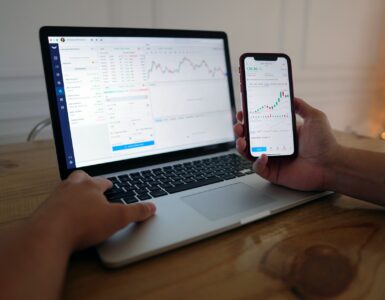Understanding all the crowdfunding lingo will help you appreciate how crowdfunding works. Here we’ve listed 18 common crowdfunding words and phrases that you might come across.
Capital
This is a term used to describe financial assets, like money.
Capital At Risk
You’ll often see the phrase “capital at risk” next to any investment information. This phrase is a gentle warning to investors that there is potential to lose part, or all of an investment.
“Capital at risk” can be applied to any investment where a full return on your original investment cannot be guaranteed. I.e. there is no guarantee that you’ll end up with more, or the same amount of money you started with.
For more information on the risks involved with investing, click here.
Crowdfunding Platform
A crowdfunding platform is another name for a website that facilitates a crowdfunding campaign. The main role of this website is to let companies raise money from members of the public.
The website will list different campaigns from different companies. They’ll then collect and process the payments between the investor and the company that’s crowdfunding.
Crowdcube and Seedrs are an example of a crowdfunding platform.
Dilution
When a company issues new shares, the existing shareholder’s ownership percentage decreases. Each existing stockholder now owns a smaller, or diluted, percentage of the company which makes each share less valuable.
A company might decide to issue new shares as a method of raising additional capital. Share dilution is not often considered a good thing. But, raising more capital can improve the company’s profitability, which then increases the value of its stock.
Donation Crowdfunding
This is a type of crowdfunding where money is gained on a donation basis from lots of different people and businesses.
Donation crowdfunding doesn’t offer any returns to the investors. It’s for this reason that charities and non-profit organizations most commonly use donation crowdfunding.
EIS
EIS stands for Enterprise Investment Scheme. This is a tax relief scheme created by the UK government to encourage people to invest in startups and small businesses.
EIS gives the investor large income tax and capital gains relief when they invest into an EIS eligible startup or business.
Equity
Equity can mean a couple of different things depending on the context.
In corporate finance, equity is the amount of money that would be returned to a company’s shareholders if all of the assets were liquidated and the company’s debts were paid. To work out the equity of a company you would therefore add up the value of all their assets, and subtract the value of their liabilities.
In reference to investing, equity usually refers to shares of stock that an investor owns.
Equity Crowdfunding
This is another type of crowdfunding where businesses fund projects by raising money from a large number of people who in return receive equity (shares) in the company.
There are lots of benefits to equity crowdfunding, but investors do need to be aware that, unlike public companies, you can’t trade your investment at any time. This could mean you don’t see any return on your investment for a number of years.
Want to know more about equity crowdfunding? Click here.
Investment
An investment is an asset you buy in the hope that one day it’ll make you more money.
A lot of people invest by putting their money into a company they believe will experience big growth. When the company grows, the value of the shares you hold will also grow. This means you might be able to make some money.
Investments are however never guaranteed. Your capital is at risk, so you might end up with less money than you started with.
IPO
IPO stands for Initial Public Offering. This is the process where a private company first sells stock to public investors.
After an IPO, the company’s shares are traded in an open market – they do this to raise money from new investors to fund future company growth.
Liquidity
This refers to how easily an asset can be converted into money without affecting the market price. For example, cash is the most liquid asset because it’s already money, while things like art and property are the least liquid.
Ordinary Share
Ordinary shares, (sometimes called common shares) are stocks that are sold on a public exchange. They give its shareholders the right to vote in company meetings on matters that impact the shareholder.
These shares sometimes also provide an income in the form of dividends from the company’s profits. This is usually decided by the company’s directors.
Primary Market
Primary market is the term used to describe the first sale of new securities to investors in order to raise investment capital for the company. An IPO is an example of a primary market.
The main thing to note with the primary market is that assets are bought directly from an issuer. This is in contrast to the secondary market where investors trade among themselves, on the stock market.
Reward Crowdfunding
Reward crowdfunding is another type of crowdfunding where investors receive rewards in exchange for their investment. Rewards could be early access to new products, free tickets, special promotions etc.
This type of crowdfunding is a popular option for startups because it provides a way to fund the launch of new products.
Secondary Market
As mentioned briefly above, the secondary market is a market where stocks are bought and sold between the investors.
It’s more commonly referred to as the stock market and sees investors trade previously issued securities without the company’s involvement.
This is opposed to the Primary Market where stocks are purchased directly from the issuer.
This secondary market provides liquidity because investors can quite easily exchange their investments for money.
SEIS
SEIS stands for seed enterprise investment scheme. A SEIS is a tax relief scheme that’s created by the UK government to encourage more people to invest in startups and small businesses.
The scheme provides some of the world’s best tax relief for investors, by giving them up to 50% off your investment to be claimed back in income tax relief. It also offers other benefits, like big capital gains tax reductions.
Share
A share is an equal unit of the total value of a company. For example, if a company is worth £100 million, and there are 50 million shares, each share would be worth £2.
If the company grows and becomes more valuable, your share would then be worth more, so your investment would be worth more.
VC
VC stands for Venture Capitalist. A venture capitalist is a private equity investor that gives money to a company if they’re showing signs of high growth. They do this in return for a stake in the company.
Summary:
Here are 18 different crowdfunding terms and phrases you might come across in your investing journey.
Before you invest in a crowdfunding campaign, it’s worth making sure you know all the crowdfunding lingo.
For more information about crowdfunding head to the Emma Community, where we’ve been discussing this in more detail.
Have you ever considered investing in Emma…? Join the conversation on the Emma Community and let us know your thoughts!







Add comment